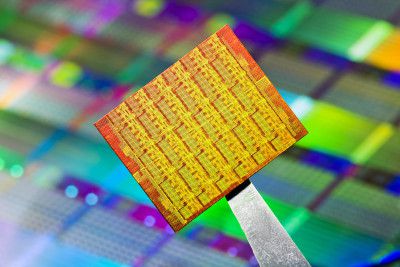From our front-page news:
In case it isn't obvious enough, both AMD and Intel believe that multi-core is the future of computing, and it's hard to disagree. It's easier for both companies to add cores than it is to build faster chips, and in a multi-threaded world, we'd still wind up with a single chip that is more powerful than anything else out there, but also a chip that's slower in single-thread operations but king at multi-thread.
Unfortunately, this "multi-thread" scheme of things is taking longer to catch on than anyone could have hoped, but with AMD, Intel and others pushing multi-core so hard, the shift is going to happen sooner than later. About three years ago, Intel released information and proof-of-concept 80-core processor, which at the time, was simply mind-blowing. This week, the company has announced a 48-core processor, and while that seems lackluster to the 80-core, you can be assured that this one is far more refined and capable.
All 48 cores are based on IA, and as a result, each is fully programmable.Energy efficiency is key, here, and depending on performance needs, the chip is able to scale between 25W and 125W on the same silicon, which as Intel points out, is equivalent to just two household light bulbs at the high-end. Intel calls the CPU a "Single-Chip Cloud Computer", because with such a large group of CPU cores working together, it works similarly to how major web services operate, and also super computers.
Each core on the chip is of course not going to be as powerful as our desktop chips today, but that's the reason there are so many of them on a single chip. Working together, the performance could blow away anything we're using today. The entire chip is split up into different sections, or "tiles" (24 * 2 cores), and sit sets of these can take advantage of independent voltage levels, and on a tile-by-tile basis, it can also take advantage of scalable frequencies.
Thanks to "routers" that are placed at each interconnect (24 in total), the cores can all talk to each other with huge bandwidth speeds, of 256GB/s. For increased memory efficiency, the chip includes a total of four independent memory controllers, with support of up to 64GB of DDR3. It's a fast chip, with even better capabilities. When we'll see these chips come to market is unknown, but Intel is accepting applications from those who want to become part of the research program behind it all. If you're a developer, or simply interested in knowing more, a lot more information can be found here.

"With a chip like this, you could imagine a cloud datacenter of the future which will be an order of magnitude more energy efficient than what exists today, saving significant resources on space and power costs," said Justin Rattner, head of Intel Labs and Intel's Chief Technology Officer. "Over time, I expect these advanced concepts to find their way into mainstream devices, just as advanced automotive technology such as electronic engine control, air bags and anti-lock braking eventually found their way into all cars."
Source: Intel Press Release
Unfortunately, this "multi-thread" scheme of things is taking longer to catch on than anyone could have hoped, but with AMD, Intel and others pushing multi-core so hard, the shift is going to happen sooner than later. About three years ago, Intel released information and proof-of-concept 80-core processor, which at the time, was simply mind-blowing. This week, the company has announced a 48-core processor, and while that seems lackluster to the 80-core, you can be assured that this one is far more refined and capable.
All 48 cores are based on IA, and as a result, each is fully programmable.Energy efficiency is key, here, and depending on performance needs, the chip is able to scale between 25W and 125W on the same silicon, which as Intel points out, is equivalent to just two household light bulbs at the high-end. Intel calls the CPU a "Single-Chip Cloud Computer", because with such a large group of CPU cores working together, it works similarly to how major web services operate, and also super computers.
Each core on the chip is of course not going to be as powerful as our desktop chips today, but that's the reason there are so many of them on a single chip. Working together, the performance could blow away anything we're using today. The entire chip is split up into different sections, or "tiles" (24 * 2 cores), and sit sets of these can take advantage of independent voltage levels, and on a tile-by-tile basis, it can also take advantage of scalable frequencies.
Thanks to "routers" that are placed at each interconnect (24 in total), the cores can all talk to each other with huge bandwidth speeds, of 256GB/s. For increased memory efficiency, the chip includes a total of four independent memory controllers, with support of up to 64GB of DDR3. It's a fast chip, with even better capabilities. When we'll see these chips come to market is unknown, but Intel is accepting applications from those who want to become part of the research program behind it all. If you're a developer, or simply interested in knowing more, a lot more information can be found here.

"With a chip like this, you could imagine a cloud datacenter of the future which will be an order of magnitude more energy efficient than what exists today, saving significant resources on space and power costs," said Justin Rattner, head of Intel Labs and Intel's Chief Technology Officer. "Over time, I expect these advanced concepts to find their way into mainstream devices, just as advanced automotive technology such as electronic engine control, air bags and anti-lock braking eventually found their way into all cars."
Source: Intel Press Release
